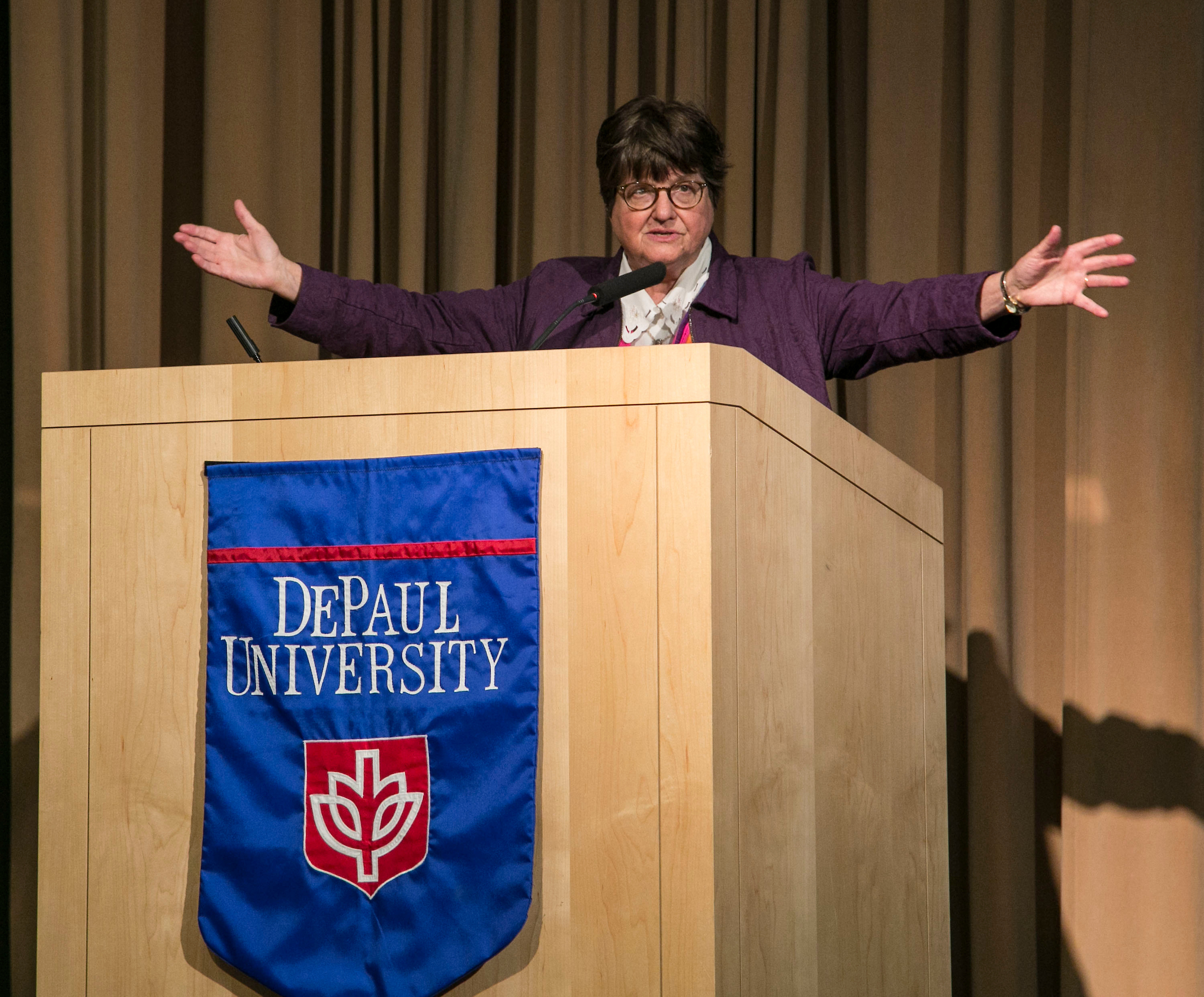 Sister Helen Prejean, CSJ, is the first recipient of the Saint Vincent de Paul Award since 2011 and just the 27th honoree since the award began in 1965. Previous honorees include former president of Poland and Nobel Peace Prize laureate Lech Walesa (1989) and influential gospel singer Mahalia Jackson (1971). (DePaul University/Jamie Moncrief)
Sister Helen Prejean, CSJ, is the first recipient of the Saint Vincent de Paul Award since 2011 and just the 27th honoree since the award began in 1965. Previous honorees include former president of Poland and Nobel Peace Prize laureate Lech Walesa (1989) and influential gospel singer Mahalia Jackson (1971). (DePaul University/Jamie Moncrief)CHICAGO — Sister Helen Prejean, CSJ, an internationally known anti-death penalty activist and author, will be awarded the prestigious Saint Vincent de Paul Award from DePaul University at a luncheon Sept. 28.
The
Saint Vincent de Paul Award is the university’s highest honor. It is conferred on very rare occasions to persons who exemplify the spirit of the university's patron by serving God through addressing the needs of the human family.
Prejean is the first recipient of the award since 2011 and just the 27th honoree since the award began in 1965.
Previous honorees include former president of Poland and Nobel Peace Prize laureate Lech Walesa (1989) and influential gospel singer Mahalia Jackson (1971).
"Sister Helen’s noble work to put an end to the death penalty is deeply connected to the foundation of DePaul’s Catholic, Vincentian mission, which recognizes the sacred dignity of every individual,” said DePaul President Robert L. Manuel. “We’re proud to present Sister Helen with DePaul’s highest award and remain honored to be entrusted with her personal archives.”
On Sept. 28, Prejean will accept the award at the St. Vincent de Paul Heritage Luncheon and participate in an engaging discussion about her work on DePaul’s Loop Campus. Though in-person registration is closed, the public may
register to join the event via Zoom. Members of the media also may RSVP to cover the noon event or to interview Prejean following the luncheon by emailing
newsroom@depaul.edu.
Prejean began her anti-capital punishment work in 1982 after moving into the St. Thomas Housing Project in New Orleans. There she became spiritual advisor for a pair of death row inmates who were eventually put to death. Those experiences led to her writing her first book, “Dead Man Walking: An Eyewitness Account of the Death Penalty in the United States,” which inspired an Academy Award- winning movie, “Dead Man Walking,” a play and an opera. Since then, Prejean has written two additional books: “The Death of Innocents: An Eyewitness Account of Wrongful Executions” and “River of Fire: My Spiritual Journey.”
She’s also met with two popes, St. John Paul II and Pope Francis, in an effort to change the Catholic Church’s position on capital punishment. The results were two updates to the Catholic Catechism. The first, by John Paul, strengthened the church’s opposition to executions with very few exceptions, while Pope Francis announced new language to the Catholic Catechism that declared: “the death penalty is inadmissible because it is an attack on the inviolability and dignity of the person.”
“Bestowing the St. Vincent de Paul Award on Sister Helen honors her remarkable life and work in addition to her special relationship with DePaul,” said Rev. Guillermo Campuzano, C.M., vice president for Mission and Ministry at DePaul. “It’s also an opportunity for us to honor who we are as an institution, what we believe in, and to recognize the essential component of what we stand for — the relational dignity of every human."
In 2011, Prejean donated her personal archives to DePaul’s Special Collections and Archives Department. Included in the archives are personal journals, notes from meetings, letters, speeches and other artifacts spanning 40 years of anti-death penalty work.
DePaul’s previous awards to Prejean include the Humanitarian Award from the College of Law in 2006 and an honorary degree in 2000.
"As good Pope Francis has put it: ‘It is the inviolable dignity of every human being, even those who have committed terrible crimes that must always preclude the state from terminating them as disposable human waste.’ St. Vincent de Paul lived in that spirit as he sought out and served the ‘throw away’ people of his day,” said Prejean. “And it is in that same Gospel spirit that led me to entrust into DePaul's archives the documents and memorabilia of my 40-year ministry to abolish state killing."
While U.S. Attorney General Merrick Garland issued a memorandum in July 2021 declaring a moratorium on federal executions, 27 states retain the death penalty with eight executions across three states currently scheduled to be completed over the final three months of 2022.
“Sister Helen’s legacy and work will not be done until every state and the federal government has banned execution and the death penalty,” said Craig Klugman, a Vincent de Paul Professor in DePaul’s College of Science and Health who researches end-of-life topics. In 2017, he joined Prejean on a panel at DePaul titled “The Ethics of Executions.” “Sister Helen does this work because of her love for humanity and because she sees value in all human life; that no one is beyond redemption or consideration.”
What: Sister Helen Prejean honored by DePaul University at St. Vincent de Paul Heritage Luncheon
When: Wednesday, Sept. 28, noon – 1:30 p.m.
Where: 1 E. Jackson Blvd., DePaul Center, Concourse Level
Media availability: Contact
newsroom@depaul.edu to attend the event or to interview Prejean following it.
###